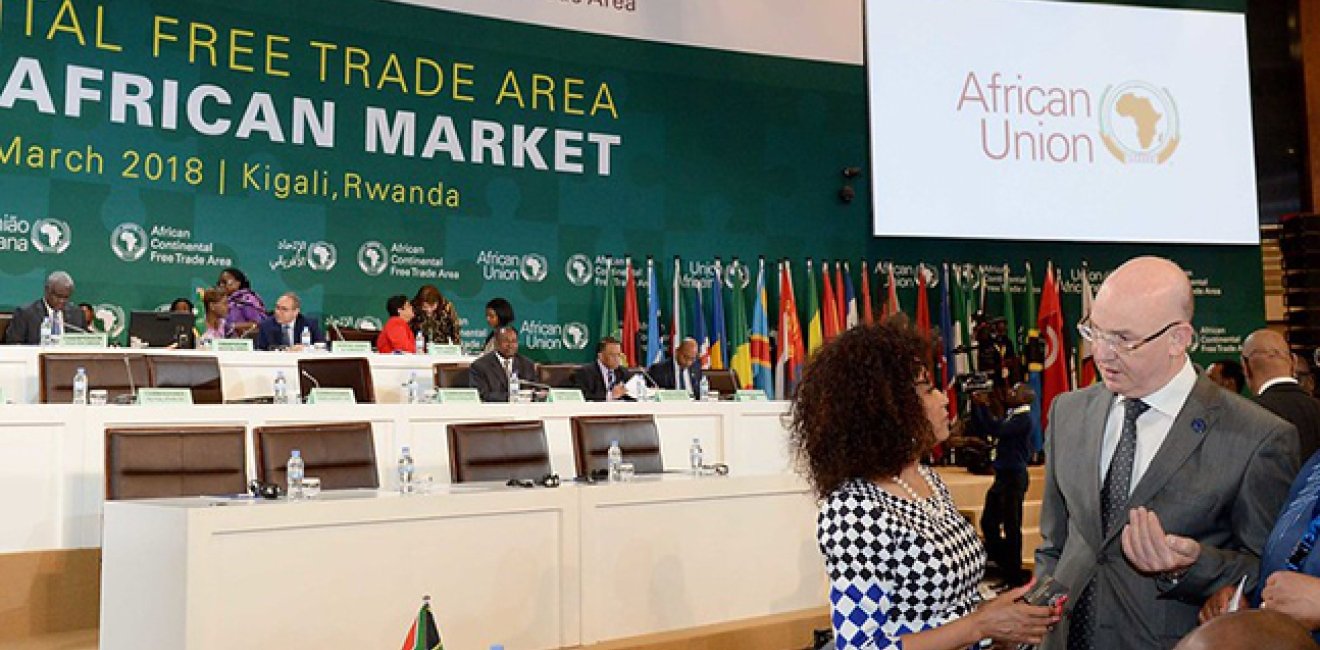
A blog of the Africa Program
The operational phase of the African Continental Free Trade Area (AfCFTA) Agreement was launched in July 2019 amidst excitement and a sense of hope, and rightly so. AfCFTA, which is on course to become the largest free trade area in the world is an agreement among 54 African nations for the creation of a single continental market for goods and services, in addition to the free movement of persons, labor, and investment geared towards a customs union. Its purpose is expanding intra-African trade through harmonized and well-coordinated trade facilitation regimes. It also aims to harmonize trade instruments across the Regional Economic Communities (RECs).
Another important aspect worth mentioning is the intent of AfCFTA. As part of its mandates, AfCFTA aims to enhance competitiveness at the industry and enterprise levels through exploiting opportunities for economies of scale in production towards continental market access. These will boost intra-continental trade, develop continental supply chains, improve export competitiveness and productivity through reductions in the cost of trade, and ultimately stimulate economic growth to create policy space for industrialization. It is time for these ambitious targets of AfCFTA to be harnessed and realized. However, at this same time, coincidentally, xenophobia is also, wildly spreading its tentacles on the African continent, wreaking havoc on this positive agenda.
Xenophobia is in direct contradiction to what the African Union hopes to achieve with AfCFTA. It casts a slur on the forebearers of African unification, and the efforts of the African Union towards Agenda 2063. The central question, which lingers, is the commitment of African leaders and their people to this ambitious project of integration.
The AfCFTA agreement is feasible, but the recent rise in xenophobic attacks in Africa has the power to derail an agreement that strengthens Africa in more ways than one. The agreement will more than double intra-African trade, which is very low, between 13 percent to 16 percent of total trade flows. Similarly, it has the potential to advance the free movement of persons and labor across the continent to support the implementation of the AfCFTA. Despite its enumerated strengths above, it will additionally impact most African countries' GDPs by 1 percent to 3 percent and total African employment could rise by 1.2 percent. Furthermore, it has the characteristics to build on rather than replace existing free trade agreements signed between the RECs, which translates to a less disruptive approach to the status quo. In fact, the benefits of the AfCFTA has been re-echoed by the leadership of the African Union, African governments, and academia to yield very high results.
The recent developments of anti-migrant rhetoric in South Africa are nerve-wracking. The Guardian reports that some of the rhetoric alleges that immigrants take jobs from locals and defraud the state; these unpleasant revelations, unfortunately, have reverberations for free movement of people and labor, as well as investments, casting a shadow over the AfCFTA's plan. The South African government has stated that it is committed to ending xenophobia, but ironically, the government does little to reduce the prevalence of attacks perpetrated against foreign nationals. Nonetheless, the African Centre for Migration and Society (ACMS) has been monitoring these attacks across South Africa since 1994. Its Xenowatch, an open-source platform tracker collates media reports as well as information from activists, victims, and observers on xenophobia. As at the end of 2018, Xenowatch recorded a total of 529 xenophobic violence incidents, resulting in 309 deaths, 901 physical assaults, looting of 2,193 shops, and the displacement of 100,000 people. These attacks by South Africans on other foreign nationals compelled some Nigerians to involuntary relocate to their home country, a devastating out-turn for proponents of the AfCFTA.
In a timely reaction, Cyril Ramaphosa, the president of South Africa in September 2019, dispatched diplomats to several African countries, including Nigeria, Ghana, Senegal, Tanzania, the Democratic Republic of Congo, and Zambia, with a clear mandate of repairing the country's image, but this may not be enough. Nonetheless, additional plan of action, deliberate and dynamic strategies are needed on the ground to create awareness and to re-awaken the mental consciousness of the African people on the detrimental effects of xenophobia. This targeted development, when actively enforced would reinforce a conscious agenda to abruptly stall the growth of nationalism among African people.
There have also been retaliatory attacks from some African countries against xenophobic attacks in South Africa. For instance, in Nigeria, the local unit of the South African telecom giant MTN Group Limited closed all of its stores and service centers in the early part of September 2019. The Group had to secure their assets and human capital after attacks on its facilities in several cities as reprisal attacks for the South African riots targeting foreign-owned businesses.
Likewise, in the commercial capital of Lagos, rioters looted an outlet of the South African discount retailer PEP, in that same month. These rising xenophobic attacks are not limited to any one African country; countries such as Zambia, Botswana, Zimbabwe, and Ghana have all been embroiled at various stages of their history in xenophobia. More recently, in Ghana, there have been rising tensions and attacks on Nigerian businesses in the capital, Accra. Similarly, anti-migrant rhetoric of job losses and circumventing trade regulations are echoed in all these instances. Indeed, John Apea, the Head of The Royal Commonwealth Society Africa office, minced no words when he said — "the bond of friendship and community between the two countries has been the envy of many across the world. It is a bond that fosters trade, culture, business, the promotion of literacy and respect for human rights" — these are building blocks for any free trade agreement.
Critically, these issues have become rampant at a period when African Nations are implementing a free trade area agreement that would significantly enhance social and economic transformation within Africa.
AfCFTA is not simply a Free Trade Agreement, it is a powerful tool for peacebuilding on the continent. It is about allowing people to freely move and work as well as hold secured investments on the continent. At the 32nd African Union summit, a representative of the United Nations Conference on Trade and Development (UNCTAD) reiterated that "at a time when trade is questioned in some parts of the world, African leaders have taken a bold step in favor of trade and of the economic integration on the continent." But the ramifications of xenophobia — especially, between the two economic giants of Africa, South Africa, and Nigeria — has the potential to derail this magnificent trade agreement and make a mockery of the spectacle that graced the launch of the AfCFTA.
It is quite clear that rising xenophobia in Africa is a bottleneck to trade, investment, and integration on the continent. Perhaps the words of Nelson Mandela "to be free is not merely to cast off one's chains, but to live in a way that respects and enhances the freedom of others" can guide African countries to make informed choices on integration. African Nations should build bridges to enhance the implementation of the AfCFTA. We daresay, Africa is at a point where crucial decisions must be made, which will have far-reaching repercussions on an ambitious AfCFTA.
Mr. George Boateng is a research analyst at the African Center for Economic Transformation and Ms. Beatrice Oforiwaa Dankyi is a Ph.D. candidate in the Department of English at the University of Ghana.
Authors

Research Analyst, African Center for Economic Transformation

Africa Program
The Africa Program works to address the most critical issues facing Africa and US-Africa relations, build mutually beneficial US-Africa relations, and enhance knowledge and understanding about Africa in the United States. The Program achieves its mission through in-depth research and analyses, public discussion, working groups, and briefings that bring together policymakers, practitioners, and subject matter experts to analyze and offer practical options for tackling key challenges in Africa and in US-Africa relations. Read more

Explore More in Africa Up Close
Browse Africa Up Close
The Innovative Landscape of African Sovereign Wealth Funds



